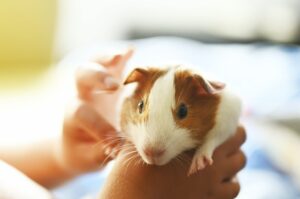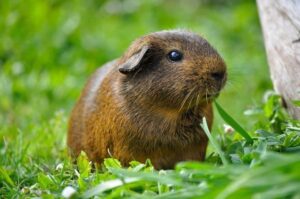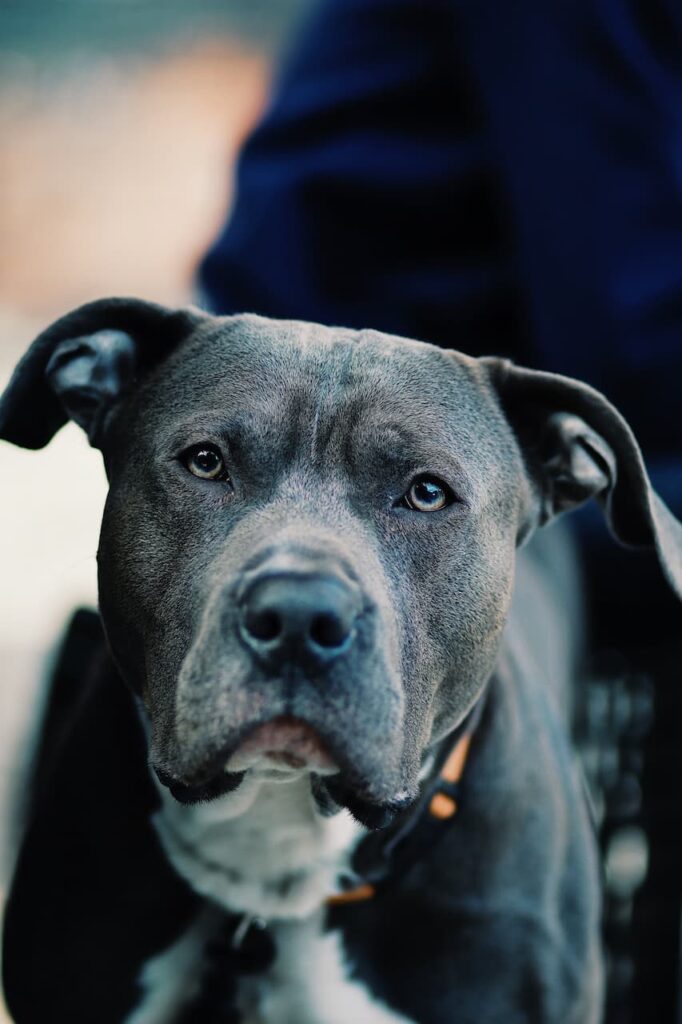Can Guinea Pigs Eat Grapes Or Not?
If you have a guinea pig, then you already know that these are some of the funniest and most adorable pets you can find.
Guinea pigs are funny little balls of fluff that chirp and squeak around, and that always seem to be on some kind of busy little mission!
With that in mind, you will no doubt want to do the very best you can to keep your fluffy companion happy and healthy.
That means feeding them a healthy, nutritious diet.
So – Yes! You can feed grapes to your guinea pigs.
Are they a great source of nutrients that your guinea’s will love like bananas? Or are they perhaps a choking hazard, or even toxic?
Let’s find out!
Table of Contents
ToggleCan guinea pigs have grapes?
In fact, guinea pigs absolutely love grapes because they’re so sweet.
And when guinea pigs eat them, they tend to get red or green juice all over their furry whiskers and beard… which only makes them cuter!
This might come as a surprise to some people who have owned other pets.
That’s because grapes are toxic for some animals – including dogs!
Dogs are, of course, much bigger than guinea pigs, so it might seem odd that guinea pigs are fine with them!
Grapes and raisins are known to be highly toxic to animals, such as dogs, and can even be fatal!
They cause a host of worrying symptoms, which include:
- Loss of appetite
- Lethargy
- Vomiting
- Dehydration
- Kidney failure
What’s more, is that we don’t actually know precisely which substance in grapes is harmful to dogs!
If you own a dog and it ingests a grape, then you must get them to a vet as quickly as possible.
They will usually recommend trying to get the dog to vomit, to bring back up the grapes.
While we don’t know what it is in grapes that causes harm to dogs, then, it seems that the same chemical is not harmful to guinea pigs!
The other good news is that guinea pigs can eat a green and red grape, and any color in between!
Health benefits of grapes for guinea pigs
Just because you can give guinea pigs grapes, that doesn’t necessarily that you should!
But as it happens, there are plenty of other good reasons to give guinea pigs grapes! The most obvious? Grapes are packed with nutrients.
For every 150g of grapes, a guinea pig will also get:
1.09g of protein
0.54mg of potassium
15 milligrams of calcium
3mg of sodium
0.11mg of zinc
4.8mg of vitamin C
22 micrograms of vitamin K
3mcg of folate
0.54mg of iron
11mg of magnesium
30mg of phosphorous
1.5g of fiber
Note that you should never give a guinea pig 150g of grapes!
That would be far too much, and in a moment, we will discuss the best ways to feed grapes to guinea pigs.
Every one of these things is beneficial for your little guinea pig in some way!
Here are a few examples of the benefits your guinea pig will get from grapes:
Vitamin C
Vitamin C is a highly potent antioxidant, as well as an essential vitamin.
Vitamin C is mainly well known for its ability to strengthen the immune system against colds and other viruses.
This is very important for a guinea pig who lives outside, and who might otherwise be susceptible to getting ill!
Vitamin C is also beneficial for several other things too.
For example, vitamin C will help to increase the production of a substance called serotonin – this is a “happiness hormone,” meaning that it can put your guinea pig in a good mood!
Vitamin C also helps to raise testosterone AND nitric oxide.
The latter improves your guinea pig’s energy, lowers its blood pressure, and improves athletic performance.
As mentioned, vitamin C is an antioxidant.
That means that it can help to fortify the cells against damage from free radicals.
These are substances that otherwise cause cell damage (particularly to the walls of the cell) and which can break all the way through to destroy the DNA stored in the nucleus.
DNA is the genetic code that defines how batteries are made, and when this becomes damaged, it can lead to imperfections.
Eventually, as those imperfections spread, it can result in the formation of cancerous tumors.
If you enjoy this article and want to know more, read ‘Can guinea pigs eat cherries‘
Magnesium
Magnesium is useful for helping your guinea pig to build strong bones that will protect it against injury.
At the same time, magnesium also helps to improve mood, to encourage learning, and to help with sleep!
Magnesium supports sleep by relaxing the muscles, helping to reduce anxiety and tension.
Finally, magnesium will also increase testosterone production.
Calcium
Calcium is great for strong bones in guinea pigs, just like magnesium.
It also helps with muscle contractions, meaning that your guinea pig will be stronger and less prone to decline as it ages!
Iron
Iron is used to create red blood cells.
Therefore, it can help your guinea pig to increase energy levels and improve circulation/the delivery of oxygen.
Resveratrol
What wasn’t included on the list there is resveratrol.
This is another antioxidant, and one that has enjoyed a lot of good press in recent years.
That’s because resveratrol is thought to explain the observation that people on Mediterranean diets seem to live a long time despite eating fatty, salty foods.
Resveratrol is found in red grapes in particular (and red wine) and helps to increase the efficiency of the mitochondria.
Mitochondria are the “energy factories” of the cells and are responsible for converting glucose to useable ATP.
By improving their productivity, resveratrol will not only improve energy levels but also extend lifespan by reducing the amount of damaging waste that gets created as a by-product of this process.
A Word on Guinea Pig Nutrition
All this may at first sound a little funny!
You probably don’t think about your guinea pig’s blood pressure much, let alone “athletic performance” or mood!
But if you want a guinea pig that will be healthy and happy, then this is the exact kind of thing you should be thinking about!
That’s because guinea pigs are wild animals, which in turn means that they need to get certain ingredients from their diets to function their best.
Too often, we are used to giving our pets food similar to the food we eat.
But why do that when we know that the food we eat isn’t good for us either? The truth is that most of us eat foods that are highly processed, meaning that much of the beneficial nutrition is gone.
This is why humans are increasingly becoming overweight, sluggish, and ill.
Unfortunately, the same process occurs much more quickly in guinea pigs owing to their small size.
That’s why it’s so important to feed a guinea pig a meal that is nutritious, natural, and not highly processed.
Grapes fit this bill perfectly!
Cautions and How to Serve Your Guinea Pig Grapes
While grapes have many essential benefits for guinea pigs, they are far from being perfect foods.
That’s because grapes are also high in sugar.
Mainly due to their small size, it is vital to limit a guinea pig’s intake of sugar.
The best advice then is not to feed a guinea pig more than 1-2 medium grapes per week.
This is considered a portion, and it should be a rare treat rather than a staple of the diet.
Along with grapes, though, you can also try other fruits like apple and strawberry.
Finally, there is a small risk of choking with grapes.
Thankfully, guinea pigs have sharp little teeth – making this rare.
You should always cut your grapes in half first, however, as this will help to reduce that risk.
Once you have cut the grape in half, hold it out on the one hand, and your guinea pig will happily lick it out of your palm and chew.
This is a great way to bond with your guinea pig too.
If you want to be extra cautious, then you can also consider peeling the grape.
This will remove one of the higher risks of choking.
However, it is worth noting that it will also reduce the amount of fiber the guinea pig is getting.
That will reduce some of the health benefits (fiber improves digestion, blood pressure, and more – it even helps to clean the teeth).
Finally, you may be wondering whether or not a guinea pig can eat a grape with seeds or stones.
Generally, the advice here is that guinea pigs should not eat grapes containing stones or seeds.
Not only are these more toxic that the grape itself, but they can also be a choking risk.
While it is possible to remove the seeds yourself, it is usually better to select seed-less grapes, to begin with.
Follow these tips, and you should find that your guinea pig loves eating grapes from your palm – and gets a ton of health benefits in the process!


